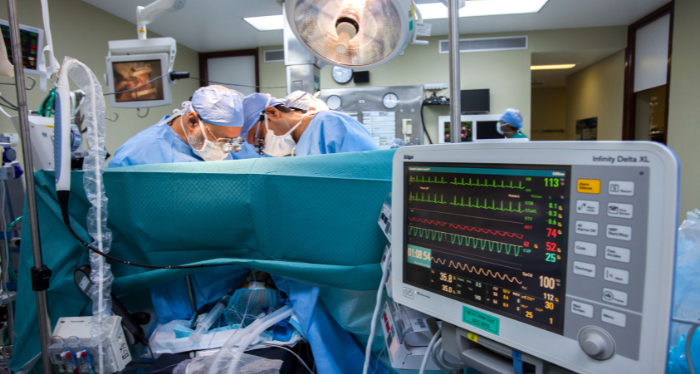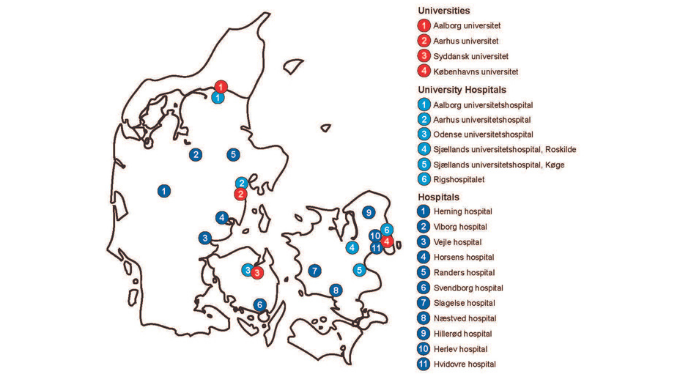
A new national research center with a focus on surgery within cancer is established under the name Danish Research Center for Cancer Surgery - ACROBATIC. Photo: Canva
20-01-2022
A new national research center is taking its first joint steps across cancer surgery these months. The Danish Research Center for Cancer Surgery, ACROBATIC, will improve surgery for most cancers and promote collaboration and sharing of 'know-how' between the various parts of a cancer course. A focus on the development of cancer surgery has long been in demand in surgical circles, and now the center is a reality.
This January, Denmark has a national gathering point for cancer surgery. The Danish Research Center for Cancer Surgery, ACROBATIC, is born, and the center will work purposefully and broadly to cover all corners of Danish surgical research - and ensure cross-disciplinary development.
"Surgery is a central part of cancer treatment for all solid tumors, so we are pleased that we can now focus on the development of surgery with a national research center", says new head of the research center Lene H. Iversen, professor and consultant at the Department of Surgery, Aarhus University Hospital (AUH).
For about a year, Lene H. Iversen has, in her own words, held 'a lot of meetings and talked to countless people on the phone' from the entire Danish cancer landscape's selection of surgeons - and also other research interests. Something good came out of it.
A collaboration rooted in 11 DMCGs
When Lene H. Iversen saw the announcement from the Danish Cancer Society regarding the establishment of a new cancer surgery national research center, she saw opportunities. Soon, many colleagues at AUH were activated and each received support from their respective Danish Multidisciplinary Cancer Groups, DMCGs. A total of 11 DMCGs. From here, it soon grew to many partners and colleagues in all five regions.
"Quickly, we had a large number of people involved from all over Denmark. The call required direct broad involvement, and sometimes it was a real hurdle to have to engage so many people in the collaboration. But it was also a strength. Because that was what the call required, "to make the center a reality. I could say 'take it or leave it' if someone would rather focus on their own cancer area", says Lene H. Iversen.
Because surgery has generally not had a great tradition of collaborating across specialties. Each area has historically focused on constantly optimising and making small improvements on its own methods - a trend towards silo work. And the silo work is also important, as it quality-develops surgical methods.
But one can also learn from looking "over the hedge".
The very broad collaboration won the application round, and a new national research center was established in collaboration with the Danish Cancer Society, with funding of DKK 20 million from Knæk Cancer funds.
Professor and consultant, Director, Lene Hjerrild Iversen
'We do not have to invent the wheel multiple times'
"Basically, it is a huge benefit to make sure that we learn from each other. We do not have to invent the wheel again and again if one method with a few changes can be used on another form of cancer as well," says Lene H. Iversen. She specifically points to the alternative use of a newer method with the use of a gentle contrast fluid, which will be included in several of the projects that have already been described and just planned in the collaboration within the new research center.
The newer technique is a scanning method that uses a very gentle contrast material. The contrast can be used in connection with several cancers, such as cancer in the pelvis organs, or to clarify the lymph nodes that are close to a tumour, so that you can specifically and gently remove the relevant lymph nodes - and at the same time spare the lymph nodes that are unrelated to the cancer.
The same method can be used to delineate the cancer of sarcoma from the healthy tissue.
Tine Engberg Damsgaard is professor and consultant at Deaprtment of Plastic surgery and Burns Treatment, Rigshospitalet, and is involved in several projects born under the new national research center. Including a project that uses the gentle contrast in breast cancer.
"We will use the method to examine the blood supply to the tissue, which is used to reconstruct the part of the area, that has been removed. The contrast scan can also be used to examine the patients' lymphatic circulation and help reconstruction, so least possible discomforts occur. Also, the method can help to treat one of the late effects of a number of cancers, namely lymphedema ", says Tine Engberg Damsgaard.
Common focus areas - for the benefit of patients
Overall, some focus areas have been set up jointly for the center, where barriers exist.
Tine Engberg Damsgaard is particularly enthusiastic about the broader way of thinking than what historically has been the case in surgery:
"When we have a national research center behind us, it helps us to work more multidisciplinary, and think - and not least plan - the entire patient's journey through together with more disciplines," she says.
The three focus areas for the centre's work are described further on the centre's page here on dccc.dk, in short they are as following:
- - Prehabilitation, i.e. improvement of a frail patient's general condition before surgery.
- - Surgical innovation and new methods, including a national protocol for experimental cancer surgery.
- - Specialised and person-specific follow-up after surgery.
"It will be a great force to be able to move the whole field together within our focus areas - I really believe that we will move quickly and efficiently", says Lene H. Iversen.
And Tine Engberg Damsgaard adds:
"For the patients in Denmark, the center's national collaboration is of great importance, as with a larger patient base we can create evidence for the treatments we can offer - and through a national collaboration, that evidence is accumulated much faster."
"We ensure that we get our skills raised and uniformed, and in this way we establish equal access to treatment - also advanced treatment - no matter where in Denmark you live", she concludes.
There are currently 34 studies planned under the center and the number is still growing.

The map shows participating institutions and departments involved in the center from each hospital.
The entire cancer landscape - including the patients - are part of the organisation.
The steering group for the Danish Center for Cancer Surgery, ACROBATIC, includes representatives from six different types of cancer patient associations. Through the organisation, they have a direct insight into what is going on in the field of surgery - and can thereby inform the patients in their hinterland. In addition, they also have the opportunity to take focus areas from their circle and present it to the steering group for discussion.
"It is absolutely fantastic that we have had so many patient representatives, because it ensures the relevance and, not least, the transparency for our primary target group, which are the patients we operate," says Lene H. Iversen.
The steering group of the National Research Center has participants from a total of 11 DMCGs - those who have solid tumours and where surgery is a very central part of the treatment. And then there are four members of the steering committee from the management of other national research centers.
"It has been a great advantage that several of the existing research centers have shown interest and participation - both to ensure a good future collaboration, but also quite banal in the application process - because they have tried it before", says Lene H. Iversen.
There has also been a need for a Business Committee in the center in addition to a steering group - something that was not actually planned at first.
"There has simply been such massive interest in this center, that we have to establish another management team, now that we have so many involved. It is a success story, and we expect to have our Executive Committee ready soon", says Lene H. Iversen.
The way forward under the motto 'open and inclusive'
A network within the prehabilitation of frail patients has already applied and received DKK 200,000 from DCCC's pool to hold a residential course, to which all interested parties are welcome. The network can be followed here.
"It is crucial to apply for more funding, and several projects have more applications out there, both large and small. Specifically, with the support of DCCC, for the network in question, we can take the time to sit down and think things through properly and together. We can do it without taking money from the main fund for the research center, which must primarily go to PhD students and other researchers' salaries ", says Lene H. Iversen.
Lene H. Iversen wishes to state that everyone is warmly welcome in the broad collaboration in the future:
"It is our goal to gather and strengthen all cancer surgeons, and I am very happy that so many DMCGs have joined the work already. We regularly receive new inquiries from people, who are not yet involved and our motto is absolutely fundamental; we want to be open and inclusive ", says Lene H. Iversen.
"I really hope that the center here can help all of us, across the surgical specialty, to improve a little bit," she concludes.
